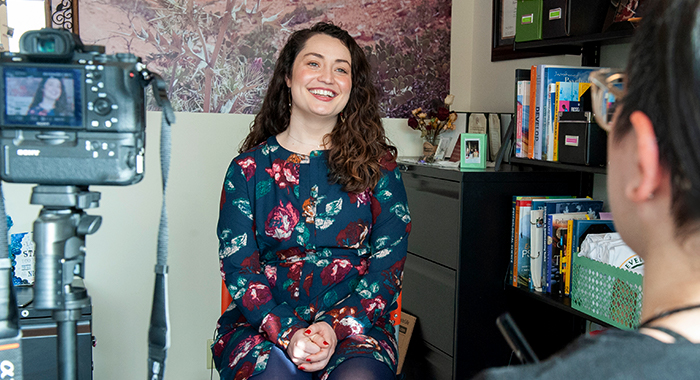PBS to Feature SNC Role Models for the Latinx Community
For many, the path to a chosen career can be traced to a single person – a mentor or a role model who provided encouragement or inspiration. For Raquel Cowell (Psychology), it was a professor. For Corinna Jauregui ’19, it was the first female Latinx clinical psychologist. For women who enter the science fields in the future, it could be Cowell or Jauregui themselves who provide the encouragement and inspiration.
Cowell and Jauregui have been chosen as role models by Twin Cities (Minnesota) Public Television for a program that showcases neuroscience careers and highlights mental health issues for middle-school girls in the Latinx community. (Latinx is the gender-neutral alternative to Latino, Latina.) Cowell and Jauregui will be featured in 4- to 5-minute videos through SciGirls, a PBS Kids television show, website and educational outreach program that focuses on engaging girls in STEM (science, technology, engineering and math) learning and careers.
The National Institute of Health-funded program, “BRAINedu: A Window into the Brain” or “CEREBROedu: Una Ventana al Cerebra,” responds to the need to eliminate barriers to Hispanic students’ STEM education and increase Hispanic participation in STEM careers. The program aims to provide culturally competent programming and media about the brain’s structure and function and about neuroscience and mental health career options. It also aims to reduce mental health stigmas and increase help-seeking behavior in the Hispanic community.
Twin Cities PBS was on campus last week to interview Cowell and Jauregui for their respective videos, speaking with them about their family life, their identification as members of the Latinx community, and their work and research at St. Norbert College. Part of the filming took place in the Developmental Decision-Making Lab in the Gehl-Mulva Science Center, where Jauregui assists Cowell with electroencephalography (EEG) research that looks into electrical activity of the brain.
“It’s always been important to me to take this complicated work and what we know about brains and to make it accessible to people that aren’t in the field, and to make it so that people feel comfortable learning about their brains and asking questions about their brains … so it’s not this mysterious, scary thing,” Cowell says. “To be able to share it with people that may be interested, with tween girls and my community, is cool. It’s really exciting.”
Forging a path
As an undergraduate student, Cowell was accepted into the Ronald E. McNair Post-baccalaureate Achievement Program, which prepares first-generation college students and students who are members of traditionally underrepresented groups for doctoral studies. She says it was a professor who started her on the path to neuroscience.
“I would not have thought to go into something like neuroscience until my professor who knew me said, ‘have you considered doing this?’ Those hadn’t even been ideas in my head. Those possibilities didn’t exist,” she says. “So to have someone suggest it, just that power of saying, ‘this is something you should think about it,’ can change what you decide to do.”
Cowell hopes the videos will give Latinx girls a chance to see someone in a neuroscience career that they can relate to, which will encourage them to consider the field themselves. “How exciting it is to do that and complete the circle that way,” she says.
Inspired by a pioneer
Jauregui’s inspiration was Martha Bernal, the first female Latinx to earn a doctorate in psychology in the United States.
“You never think that there was a first – a first to do this, a first to do that. So when I read her name I was like, ‘of course there must have been a first Mexican psychologist,’ and that was exciting,” Jauregui says. “If she can do it, I can do it. And I think that’s the best way to [encourage] someone, or to have them as your role model.”
As she takes on the status of role model herself, Jauregui wants to share her story – about her parents emigrating from Mexico, about learning English together as a family when she was 5, about starting to work in her parents’ restaurants at age 12, and about working hard to gain admission to grad school – and hopes that other Latinx girls can relate.
“It’s a lot of pressure. I don’t want to be the spokesperson for everyone that’s ever been in my shoes. I can only speak for my experiences. Even though I know for a fact that people are going through the same thing I did, I also don’t want to generalize,” she says. “My parents have legal status now, and I know others don’t – so things that I can do I know others probably can’t, and I want to keep that in mind. … But my way of being a role model is just being myself and hoping people find something to relate to.”
The videos of Cowell and Jauregui is intended for use in classrooms in the Minneapolis/St. Paul area and will be shared on the PBS Kids SciGirls website.
Dec. 19, 2018












